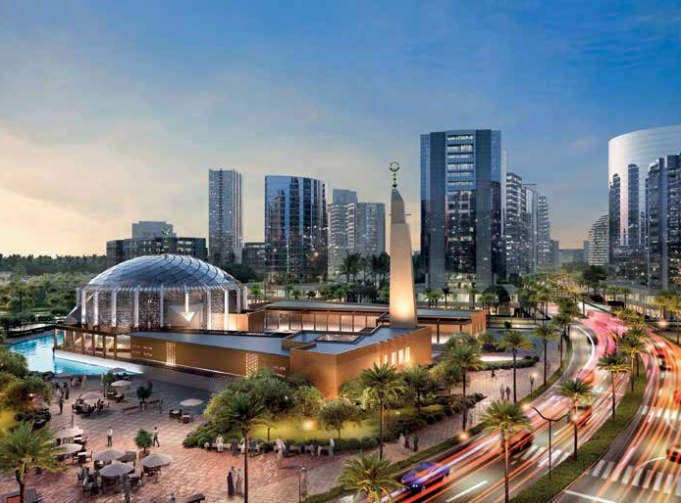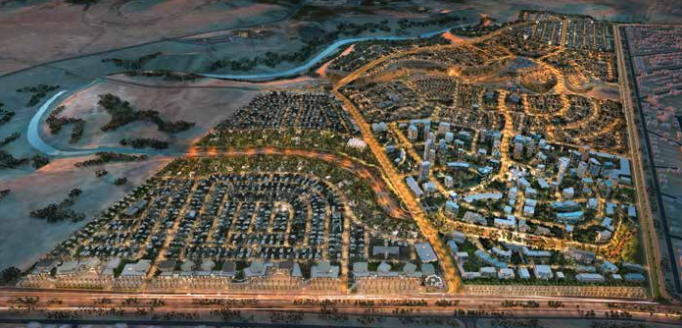DUBAI: Tabby, a Dubai-based buy now, pay later service, has raised $50 million in debt financing.
The investment came from US-based Partners for Growth (PFG), and will be used to expand Tabby’s lending capacity, it said in a statement.
Transaction volumes and merchant numbers of the platform have significantly increased since it was founded in 2019, CEO Hosam Arab said.
“It was essential for us to partner with an organization that would support our current and long-term growth,” he added, referring to the PFG investment.
The global lending firm has particularly focused on emerging growth companies, providing debt facilities to up and coming startups such as Tabby.
“Tabby is one of the fastest growing companies in the MENA region and they have an attractive market opportunity ahead,” Max Penel, PFG’s investment director, said.
“We are excited to support the tabby team and provide financing that can enable tabby to scale the platform, harnessing the continuous growth of the buy now pay later sector both regionally and globally,” he added.
Dubai’s Tabby gets $50m in debt financing
https://arab.news/8vtgs
Dubai’s Tabby gets $50m in debt financing

- The investment came from US-based Partners for Growth (PFG)
- It will be used to expand Tabby’s lending capacity
Saudi Arabia’s non-oil GDP defying expectations, finance minister tells World Economic Forum

- IMF downgrading of Kingdom’s growth projection for the year ahead did not paint the full picture, says Minister Mohammed Al-Jadaan
- KSA’s economic diversification was driving steady growth, with the Kingdom prioritizing its non-oil GDP over traditional oil revenues, he said
DAVOS: Saudi Arabia’s finance minister on Wednesday said that the recent International Monetary Fund downgrading of its growth projection for the Kingdom’s economy for the year ahead did not paint the full picture.
Speaking on a panel at the annual meeting of the World Economic Forum in Davos, Mohammed Al-Jadaan said that it was important not to look just at gross domestic product but at other indicators as well.
The IMF revised Saudi Arabia’s 2025 GDP growth projection down to 3.3 percent, citing the impact of extended oil production cuts.
Saudi Arabia’s commitment to economic diversification under Vision 2030 was driving steady growth, with the Kingdom prioritizing its non-oil GDP over traditional oil revenues.
“The whole idea of Vision 2030 is to diversify our economy. So our focus is really the non-oil GDP, and non-oil GDP has been growing very healthily over the last few years,” he said.
Al-Jadaan underscored the significance of private-sector confidence, pointing to a sharp rise in private-sector investment as a percentage of GDP — from 16–17 percent a few years ago to 24 percent today.
“That 50 percent increase is not easy. Ask any economist, and they will tell you it requires significant structural change, and it is happening in Saudi Arabia,” he said.
Saudi Arabia had also made strategic decisions to contain oil production despite having significant spare capacity. “We can produce 1,000,000 barrels more per day and we will have the highest-growing GDP in the world, but how is this helpful? It isn’t, actually,” Al-Jadaan said.
“We need to be very careful when we look at GDP as a measure for growth because you need to look at other indicators,” he added.
With unemployment rates at historic lows and the private-sector thriving, Saudi Arabia continued to make “tough, difficult decisions” to sustain long-term growth. “If you want to see it, you will need to make tough decisions,” Al-Jadaan said.
Al-Jadaan also highlighted the role artificial intelligence could play in this diversification of the economy, saying in the future that the Kingdom could be exporting data instead of oil.
“I think AI is a trendy term, but if we are not careful we could be left behind,” he said. “We need to think: Where is our competitive advantage within the value chain of AI?”
To build the necessary infrastructure for AI, significant amounts of energy, particularly clean and renewable energy, were required, he said. This effort also demanded substantial land for renewable projects, robust fiber-optic networks and a skilled workforce.
According to Al-Jadaan, Saudi Arabia’s competitive edge lies in its ability to produce the world’s cheapest solar power, its government’s agile and supportive policies allowing quick licensing and approvals, and the Kingdom’s plans to implement regulatory measures that treat data centers with the same protections as embassies, ensuring robust security and compliance with international standards.
He also highlighted that Saudi Arabia was a world leader in government cybersecurity, adding that it was “handled, operated, managed, programmed and coded 100 percent by Saudi talent.”
Discussing the broader Middle East and North Africa region, which is projected to rebound from a growth rate of 2 percent in 2024 to 3.5 percent in 2025, according to IMF projections, Al-Jadaan said that he was optimistic about the region’s prospects.
He acknowledged its significant challenges, including high youth unemployment and geopolitical crises.
“MENA has possibly the highest youth unemployment in the world, at I think 27, 28 percent. MENA needs to create, according to the IMF, about 30 million new jobs by 2030,” he said.
Despite these challenges, Al-Jadaan highlighted the region’s strengths, including a young, tech-savvy population and abundant natural resources. “If we focus on human capital, if we focus on skilling our people in MENA, I think the potential is absolutely high,” he said.
He also called for regional stability and reform to unlock long-term potential, adding: “With the right ingredients of reforming governments, reforming governance and utilizing technology to our own competitive advantage, I think we’d see a new region.”
Saudi Vision 2030 spurring growth across the real estate sector, says industry leader at Davos

- Sustainability is at the heart of Saudi Arabia’s real estate development, says Dar Al-Arkan Chairman Yousef Al-Shelash
- Housing demand in Saudi Arabia is surging, driving the need for significant funding and development
DAVOS: Saudi Arabia’s real estate sector is undergoing a transformation that ranges from affordable housing to luxury living under the Kingdom’s Vision 2030 reform agenda, according to the chairman of Saudi company Dar Al Arkan.
Yousef A. Al-Shelash highlighted the strides being made during a conversation with Arab News at the annual meeting of the World Economic Forum in Davos on Wednesday.
“The Vision 2030 has developed the whole economy, not only the real estate sector,” Al-Shelash said. “It’s developed not only the approach of the sector, but it has also brought a new standard in regulations to be as good as we deserve.”
As one of the world’s top 20 economies, Saudi Arabia’s evolving real estate market reflects its broader ambitions. “As a country, we are one of the big 20 economies of the world, so we believe the Saudis deserve more,” Al-Shelash added.

Vision 2030 places a strong emphasis on affordable housing and improving living standards for Saudi citizens. Al-Shelash said that the government is playing a proactive role in ensuring these goals are met.
“The vision is there not only to facilitate for the developers and for the foreign investors, but also to facilitate affordable housing for most of the Saudi citizens,” he said.
The Kingdom’s growing population and rapid urbanization have led to a pressing demand for housing.
“The Kingdom needs more housing, and that requires a lot of funding and development,” Al-Shelash said.
He emphasized the role of government entities such as the Public Investment Fund and the Ministry of Housing in elevating the industry’s standards.

“The government itself has entered to become a developer or a service provider, not just to compete with the private sector, but to raise the standard,” he said.
In addition to affordable housing, Saudi Arabia is experiencing strong demand in the ultra-high-net-worth individual market. “There's a lot of demand. We have more than 3,000 brokers worldwide, a lot of demand from foreign entities to invest in (the Kingdom) and to hold a second home in Saudi Arabia,” he added. He also expressed his confidence that regulatory changes to facilitate such investments “will be coming any time now.”
Dar Global, the international arm of Dar Al Arkan of which Al-Shelash is vice-chairman, listed on the London Stock Exchange in 2023 and Al-Shelash underscored the significance of this move. “London is for sure an attractive market for Saudi investors. The stock exchange there is one of the best worldwide. So that will put the company on a very high standard regulation,” he said.
The listing not only positions Dar Global among the world’s most regulated markets but also strengthens its ability to collaborate with local partners in diverse regions. “To be a developer, you have to be with some other partners. So, if you would like to do some joint ventures or work with other companies — because the real estate industry is everywhere — it’s about local knowledge,” he said.
Developing real estate sustainably is becoming a cornerstone of the Kingdom’s development strategy, and this is the case for Dar Al Arkan, domestically and internationally. “Developing sustainably is about embracing and using the technology that’s out there and facilitating green practices wherever possible,” Al-Shelash said.
AI can offer solutions for water scarcity say WEF panelists

- Christophe Beck: We need to redesign our processes being data centers, mill production, or processors in ways that the water never leaves the site
- Fabrizio Palermo: AI can also help in the transportation of water because it’s a question of managing data
DUBAI: Artificial intelligence can be used to reduce wastewater and redesign systems to facilitate resource recycling, a panel of experts told the World Economic Forum in Davos.
Christophe Beck, chairman and CEO of Ecolab, said countries are becoming aware of the need for water to produce chips that get into the AI chain, which could, in return, be used to reduce wastewater.
According to UN figures, by 2030, more than half of the world’s population will be water stressed, affecting economics, health and existing food scarcity and threatening $1.6 trillion in assets.
“We need to redesign our processes being data centers, mill production, or processors in ways that the water never leaves the site. That’s what we do in data centers related to chip cooling where water never leaves the data centers, unlike the old technologies,” Beck said.
He called for legislations that enable the use of new technologies to reuse water, which ultimately saves energy. “Up to 75 percent of the energy used by power plants is used to manage, heat, cool, transport and treat water. When we reuse and recycle the water, we save energy and money, as well as reduce carbon footprint,” Beck said.
The Water Resilience Coalition aims to get 150 companies that affect a third of the world’s water usage to make three commitments: to save water by saving energy and leveraging technology; work on the 100 most critical basins that are serving 3 billion people; and provide water to 300 million people.
“It is business driven, and it is capital that’s invested at a return, creating a business model that is ultimately much more sustainable and provides water for people in need,” Beck said.
Fabrizio Palermo, CEO and general manager of Acea, emphasized the need for investment and funding in water resilience, given water’s importance to agriculture, industry, energy and AI.
An ecosystem needs to be created to protect sources, collect rainwater properly and achieve maintenance on basins, he said.
“AI can also help in the transportation of water because it’s a question of managing data. This infrastructure in Europe has been designed more than 56 years ago where the landscape in terms of technology was completely different and no one is in a situation to do predictive maintenance on this infrastructure,” Palermo said.
He called for net zero in water to avoid waste and curb government spending on health.
“It is very important that the water is reused and not sent to the rivers and then to the sea because water is linked with water. Government spending on health is related to water because the consequences of not having proper fresh water are evident nowadays,” Palermo said.
Meanwhile, Fajer Mushtaq, co-founder and CEO of Oxyle, warned of the effects of synthetic chemicals, known as PFAS compounds, on water contamination in Europe, calling for regulations and corporate responsibility to tackle water treatment and monitor the safety of discharged substances.
“I think it’s a systematic problem. The biggest barrier is to enable a proper treatment of water, which is not just going to be from a PFAS perspective, but our system that makes micropollutants.”
Technology needs to be directed at creating a new ecosystem, guided by clear regulations, to ensure safe water is provided for communities, Mushtaq said.
Oman’s Asyad Group plans to sell at least 20% of shipping unit via IPO

- Offering will be made in two tranches, with 75% made to eligible investors in Oman and qualified institutional and other foreign investors
- Remaining 25% will be sold to retail investors in Oman
DUBAI: Oman’s state-owned logistics firm Asyad Group plans to sell shares in its shipping subsidiary through an initial public offering, it said on Wednesday, as part of the Gulf country’s privatization drive.
The group, owned by Oman’s sovereign wealth fund, plans to sell a stake of at least 20 percent in Asyad Shipping Co. and float it on the Muscat stock exchange, it said in a document detailing its intention to float.
“The intended listing would provide investors with the opportunity to invest in one of the world’s largest diversified maritime shipping companies and a key player in the Omani economy,” the company said.
Oman is pushing forward with a privatization drive to attract foreign investors.
That strategy, along with fiscal reforms, has helped the sultanate pay down debt and turn its large fiscal deficit of recent years into a surplus since 2022.
Asyad Shipping focuses on transporting liquefied natural gas, crude oil and other products. It lists energy firms BP and Shell, as well as trading firm Trafigura among its customers and partners.
Reuters reported in July last year that Asyad was planning an initial public offering of the subsidiary and had selected Jefferies Group and EFG Hermes as advisers.
The offering will be made in two tranches, with 75 percent made to eligible investors in Oman and qualified institutional and other foreign investors. Of the 75 percent tranche, 30 percent of shares have been earmarked for anchor investors, the firm said, without naming them.
The remaining 25 percent will be sold to retail investors in Oman.
The subscription period is expected to start next month, after the company has received regulatory approval.
Asyad Shipping plans to pay dividends semi-annually, beginning in September 2025 for the first six months of this year.
The company posted an adjusted core profit margin of 69 percent for the first nine months of last year, up from 65 percent over the same period in 2023.
Oman Investment Bank, EFG Hermes, JP Morgan and Jefferies are acting as joint global coordinators. Sohar International is acting as joint global coordinator and as issue manager.
Credit Agricole and Societe Generale are joint bookrunners.
Closing Bell: Saudi Arabia’s main market dips slightly to 12,362

RIYADH: Saudi Arabia’s Tadawul All Share Index was steady on Wednesday, as it marginally shed 7.21 points or 0.06 percent to close at 12,362.39.
The total trading turnover of the benchmark index was SR7.62 billion ($2.03 billion), with 109 of the listed stocks advancing and 122 falling.
The Kingdom’s parallel market Nomu also declined 317 points to close at 31,000.87, while the MSCI Tadawul Index edged down by 0.26 percent to 1,545.02.
The best-performing stock on the main market was Naseej International Trading Co. The firm’s share price surged by 9.96 percent to SR108.20.
Naseej was one of the three Tadawul-listed firms, alongside Saudi Cable Co. and Middle East Specialized Cables Co., to hit their highest levels in a year.
Saudi Cable Co. peaked today at SR128, compared to SR62.9 in March, a 103.58 percent increase.
Middle East Specialized Cables Co. share price jumped from SR21.28 in January 2024 to close at SR47.2 today.
Naseej International Trading Co.’s share price increased 55.7 percent from January last year to close at SR98.4 on Wednesday.
Other top gainers were Jahez International Co. for Information System Technology and Middle East Healthcare Co., whose share prices grew by 6.09 percent and 4.75 percent, to SR33.95 and SR79.40, respectively.
National Medical Care Co. and Al Jouf Cement Co. also saw a positive change, with their share prices surging by 4.12 percent and 4.01 percent to SR161.6 and SR11.92, respectively.
Elm Co. saw the steepest decline of the day, with its share price dropping 4.03 percent to close at SR1,176.2.
United International Transportation Co. and Etihad Atheeb Telecommunication Co. declined, with their shares slipping 2.72 percent and 2.66 percent to SR82.30 and SR102.60, respectively.
On Nomu, Armah Sports Co. was the best performer, with its share price rising by 7.34 percent to reach SR95.
Quara Finance Co. also delivered a strong performance as its share price rose by 5.26 percent, reaching SR20, while Arabian Food and Dairy Factories Co. recorded a 2.99 percent increase at SR99.
WSM for Information Technology Co. shed the most on Nomu, with its share price dropping by 6.33 percent to reach SR53.3.
Saudi Parts Center Co. experienced a 6.25 percent decline in share prices, closing at SR60, while First Avenue for Real Estate Development Co. 6.04 percent to settle at SR9.02.






















